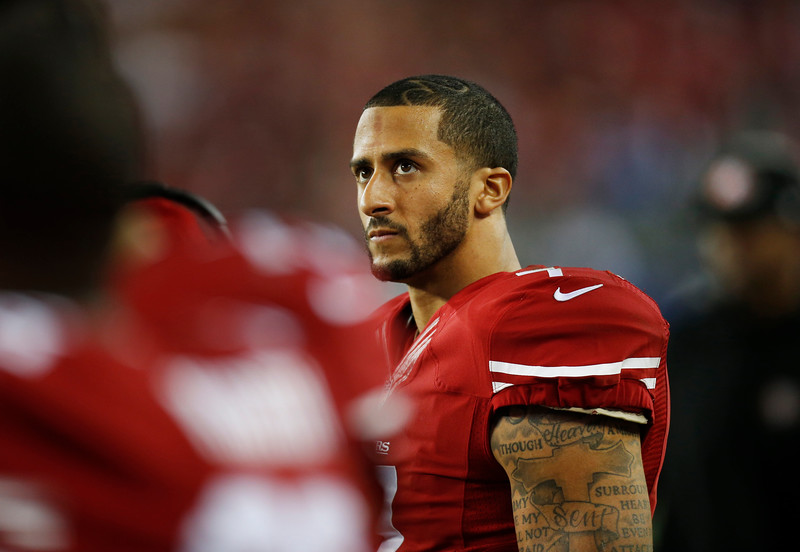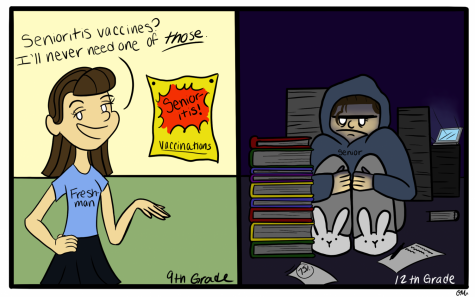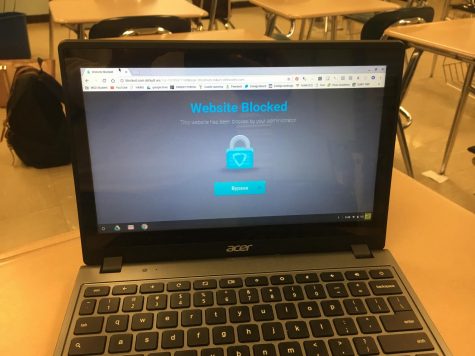Counterpoint: Colin Kaepernick’s flawed form of protest
Taking a knee for justice
The stars and stripes of our nation have enduringly symbolized the unity and freedom of our country from the genesis of the United States more than two and a half centuries ago. Despite our nation’s strong history of standing together with our fellow countrymen to solve our greatest problems together, some often find it necessary to rebel against the red, white, and blue. In times of great division, such as during the Vietnam-War Era, our nation found itself so drastically and emotionally divided and entrenched in certain ideologies that patriotism fell to the wayside in favor of protest. Flags were burned, ripped, or treated with disrespect. Leaders of different factions spoke out against our nation. Americans were practically forced to take sides against each other.
While these unpatriotic gestures may succeed in getting certain issues talked about, do they really help embrace change in policy and legitimate conversation?
In all honesty, when a certain viewpoint becomes so enraging and divisive so that it encourages one to protest his or her own homeland by dishonoring the flag, less people of that nation begin to tolerate it. Such protests often don’t lead to discussions of policy and the facts of the issue, but more so just encourage people to acknowledge the existence of an issue.
In the case of Colin Kaepernick, the San Francisco 49er’s quarterback, who recently refused to stand up during the National Anthem claiming that he will not “stand up to show pride in a flag for a country that oppresses black people and people of color,” it is practically impossible to argue that Kaepernick doesn’t have the right to sit during the national anthem, seeing that it is a matter of free expression. However, the idea of not standing for the national anthem appears to be so disrespectful and almost taboo that his method of trying to get a point across actually distracts from the point he’s attempting to make.
Kaepernick, like any protester of police brutality and discrimination in law enforcement, desires some form of change to prevent the continuation of this terrible trend. However, there are many other ways he can do this beyond not standing for the national anthem, such as speaking at a Black Lives Matter rally about policies, discussing his concerns directly with the media or donating to a charity or fund that seeks to eliminate the problem.
Granted, in recent weeks Kaepernick has committed himself to partaking in the latter two actions stated, which I personally applaud him for. This move shows that Kaepernick understands that this effort must be about more than just awareness, but also action. Nonetheless, the argument against not standing for the national anthem still stands as a flawed form of protest.
Kaepernick may be protesting against police brutality and discrimination across the United States, a definite issue that the nation has already been gradually seeping into the national consciousness with the rise of the “Black Lives Matter” movement, but he does not succeed in helping this movement gain further support by alienating his fellow Americans when he doesn’t stand. By sitting, Kaepernick not only refuses to stand for the discrimination in this country, but he is also refuses to stand for the soldiers who fought and died to defend his rights to freedom of speech, the law enforcement that protects local communities and who needs to hear his message in a tolerant manner so a solution can be found, and the members of those communities who would be willing to step forward and help the movement, which drastically hurts his case.
AP Government teacher Mr. Bachman recently commented on the effectiveness of Kaepernick’s decision to sit during the national anthem, claiming that Kaepernick’s approach is “obviously attention grabbing,” but could be seen as ineffective due to the fact that “it’s immediately polarizing” and that such a form of public protest must attempt to be more “attention getting and persuasive.” Mr. Bachman argued that, “Choosing to sit during the national anthem in front of an audience that’s typically very patriotic, per say, you’re not going to get people who are not already on your side on your side.”
By sitting, Kaepernick clearly overlooks one of the greatest flaws of the Black Lives Matter movement and even the Blue Lives Matter movement: the idea that being against discriminatory practices in law enforcement and against policies that endanger police are mutually exclusive. It is perfectly feasible to be pro-law enforcement but also against police brutality and discrimination, however too often people feel the need to take one side since both movements are giving off a vibe of exclusivity towards each other, which only continues to halt cooperative progress on the issue.
With struggles as great as this in our nation, we cannot turn against our flag, but we must turn towards it and stand up with faith that our democratic system will bring justice and with action to match our statements.





